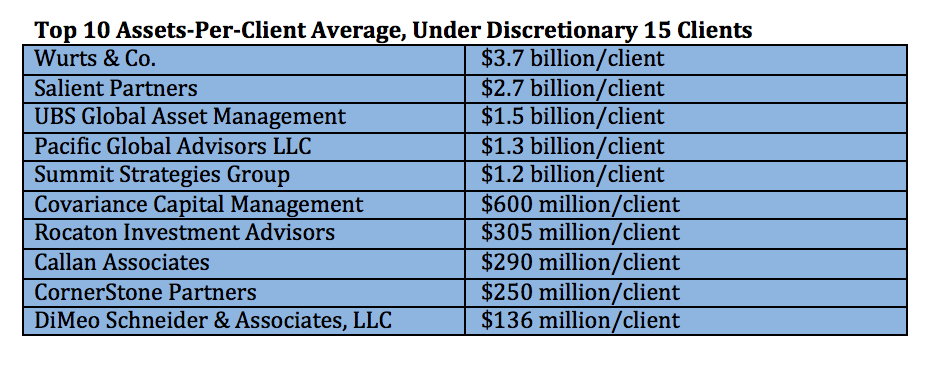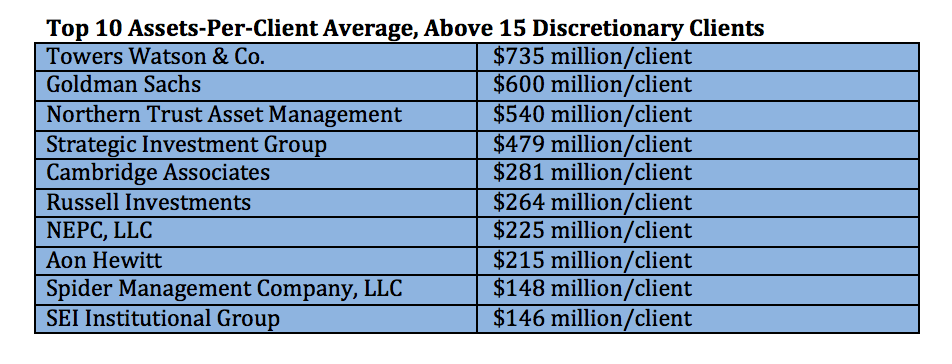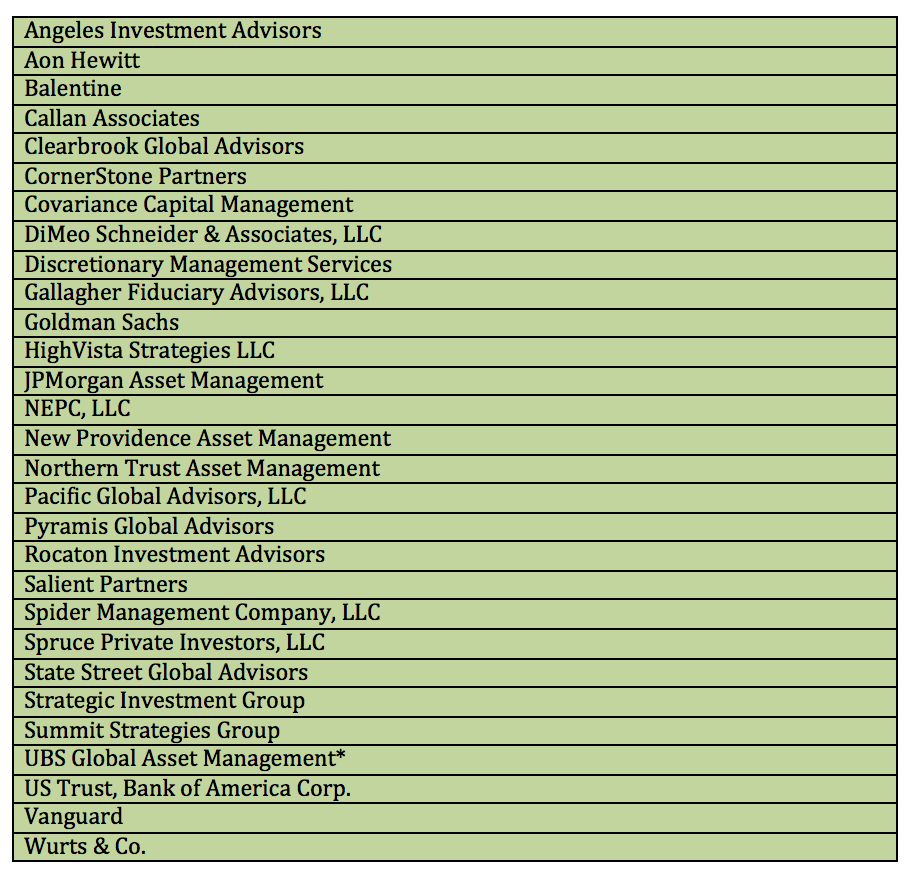(February 19, 2014) — Russell Investments, Mercer, and SEI are the largest outsourced-CIO providers—but a group of less established OCIOs is marching up the league tables in mandate size, total client numbers, and transparency.
In the US, which is arguably the largest market in this field,aiCIO’s 2014 OCIO Buyer’s Guideshows these up-and-comers include Jeff Scott’s Wurts & Co. and Lee Partridge’s Salient Partners, which lead the industry in average assets-per-client for firms with fewer than 15 clients. However, it is establishment-player Towers Watson & Co. that leads this category for OCIOs with more than 15 clients.
Another example: While it is hardly lacking in establishment credentials, US Trust, Bank of America Corp. leads the industry in total client numbers. However, when a minimum mandate is applied—in an effort to show who rules the large-market segment—US Trust disappears from the running leaving SEI claiming the most clients.
Transparency, however, seems to be a young firm’s game. Of the 37 firms that participated in this year’s guide, six were rated as lagging or only neutral regarding the transparency of their business, based on the level of supplied data. Of those six, however, 40% were among the 10 largest OCIO firms in the business, as measured by total discretionary assets.
For access to the full interactive Buyer’s Guide, click here.
The Largest: Total Discretionary Assets and Client Numbers
Familiar names sit atop the OCIO total discretionary assets league table. Following the top three of Russell, Mercer, and SEI, Northern Trust Asset Management ($42.1 billion), Aon Hewitt ($28.6 billion), and Strategic Investment Group ($23 billion) and Hirtle, Callaghan & Co. ($23 billion) round out the top seven. [Note: To accurately reflect the large market OCIO segment, firms must have an average of $50 million per client to qualify for this league table.]

When measured by total clients, however, a number of new names populate the top 10.
US Trust, Bank of America Corp. claims the most clients at 537, despite not being among the top 10 in total discretionary assets; HighVista Strategies (254), Balentine (205), and Vanguard (181) also move into the top 10. Such figures, however, suggest that these four OCIOs serve the smaller end of the market—a market largely ignored by most major players in favor of larger client mandates.

When minimum mandates are considered, more established OCIO players once again rise to the top. When a $25 million minimum mandate is considered, SEI, Russell, and JPMorgan lead the total-client table; other firms with significant client figures include Strategic Investment Group, Cambridge Associates, and Goldman Sachs, among others.

*While Towers Watson has no official minimum, the firm claims that “a minimum annual fee may preclude interest from funds <$75million.”
[For transparency leader and laggard tables, see the following page.]
The Largest: Assets-per-Client Average
Rated by assets-per-client (for firms with fewer than 15 clients), two relatively new firms—Jeff Scott’s Wurts & Co. and Lee Partridge’s Salient Partners—benefit from having a small number of very large clients.
With three discretionary clients totaling $11 billion, Wurts tops the charts of assets-per-client; Salient, whose most famous client is the San Diego County Employees’ Retirement System, comes in second at $2.7 billion/client. Charles Service’s UBS Global Asset Management and David Oaten’s Pacific Global Advisors come in third and fourth, followed by Summit Strategies Group.

When firms with more than 15 clients are considered, Towers Watson—only seventh in terms of total assets under discretion—fairs better when measured by average mandate size.
With an average of $735 million per client, Towers Watson leads Goldman Sachs ($600 million), Northern Trust Asset Management ($540 million), and Strategic Investment Group ($479 million).
Firms making the top 10 of total discretionary assets that fall off the list when client size is considered include Mercer, Hirtle Callaghan, and JP Morgan Asset Management.

Transparency: Leaders and Laggards
Based on the self-reporting of their business’ breakdown, there is a diversity of transparency offered by OCIOs in the Buyer’s Guide.
Hirtle Callaghan & Co., Mercer, and SEI are the transparency laggards among respondents. All three failed to provide granular data on their client type or regional breakdowns, choosing to only show total discretionary assets and client numbers.
Cambridge Associates, Fund Evaluation Group, LLC, and Russell Investments occupy the transparency middle ground. While they provided total discretionary assets and client numbers, they only provided client-type breakdown or regional breakdown—not both. Cambridge Associates failed to break down its businesses regionally; Fund Evaluation Group failed to break down their business by client type; Russell did not elucidate their regional breakdown, and only provided client-type figures for the ”corporate pension fund” and ”other” categories.
The remaining respondents—including top 10 firms (by assets) Northern Trust, Aon Hewitt, Strategic Investment Group, Towers Watson, Goldman Sachs, and JP Morgan Asset Management—provided full transparency for the buyers’ guide.
Transparency Laggards
Members of the Transparency Laggards group failed to provide both client-type and regional breakdowns.

Transparency Neutrals
Members of the Transparency Neutrals group failed to provide one of the following: client-type breakdown, or regional breakdown.

Transparency Leaders
Members of the Transparency Leaders group provided total transparency.

*UBS provided regional data after the print edition deadline. All their clients are based in the US.
